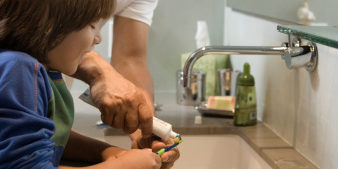Parents Behavior Can Affect Kids Oral Health

A new study published in the Canadian Journal of Dental Hygiene has brought renewed attention on the existing crisis that exists in children’s oral care and provides a proven method of treatment and behavior modification that has shown success in improving the way kids approach oral hygiene.
In the study, researchers at the DentaQuest Institute reported on the opportunities to increase prevention in dentistry. Researchers noted that nearly 41 percent of the population in the U.S. five years of age and older suffer from some type of untreated tooth decay, according to studies conducted by the Centers for Disease Control and Prevention. Children living in households at or below the U.S. government’s poverty line suffer from the highest prevalence of untreated tooth decay, at just over 25 percent.
Further highlighting the issue at hand, researchers cited a recent study by the Centers for Medicare and Medicaid Services that showed that only 47 percent of kids receiving Medicaid had access to some kind of dental care in 2013.
While researchers acknowledged that Medicaid provided for treatment of oral disease, an opportunity to promote preventative care that would reduce decay and the need for surgery were being missed.
Parent Behavior Can Have Significant Impact
According to researchers, as the knowledge of dental disease and prevention has improved, the opportunities to provide necessary care and preventive intervention has also increased. Researchers then touted a collaborative effort between the DentaQuest Institute and Boston Children’s Hospital to find a way to reduce childhood tooth decay.
The systems used in this collaborative venture to reduce rates of decay included a risk and behavior assessment of parental actions. Citing a 2002 study, researchers noted that when relating to detrimental health behavior, a change in parental behavior can contribute four times more to significant change when compared to medical assistance.
For example, many parents are unaware of the detrimental effects placing juice in sippy cups presents towards their child’s oral health and how it increases the risk of oral decay. By encouraging parents to change this type of behavior, such as by putting water in the bottle at bedtime instead of juice or milk, parents can make a dramatic difference to their children’s oral health.
Additionally, researchers stated that parents can also improve the oral health of older children by leading by example when it comes to practicing quality oral hygiene. By making it a point to brush and floss along with their kids, parents can help lead by example of what it means to practice quality oral hygiene.
Children are far more likely to follow a parents example rather than just do as they are told when it comes to practicing quality oral hygiene, explained researchers. By providing a practical example, parents are far more likely to help establish good oral hygiene habits with their kids.
If you have any questions about your kids oral health please contact your choice for Southwest Portland Kids Dentist: Dr. Howard Jarvis, today
